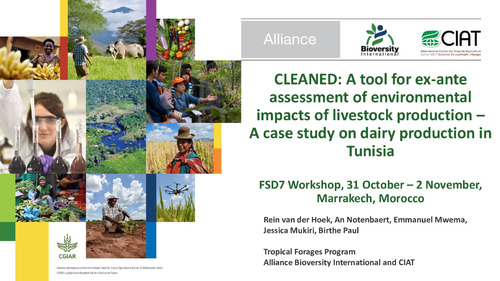CLEANED: A tool for ex-ante assessment of environmental impacts of livestock production – A case study on dairy production in Tunisia
In Tunisia, the dairy sector faces several productivity and competitiveness challenges, including a low processing rate of agricultural products, poor entrepreneurship among small farmers, and inadequate/unsustainable management of natural resources. For instance, water requirements for irrigation often exceed supply leading to irreversible depletion of aquifers.
The main objective of the study was to assess the potential environmental impacts of the transformation of the dairy value chain in Tunisia, through a collaboration between the Alliance/CIAT, GIZ and partners.
The specific objectives of the study were:
• Assessment of the current environmental, climate and economic impacts of smallholder dairy farms in the project intervention areas (Gouvernorats of Jendouba and Sidi Bouzid)
• Ex-ante impact assessment of proposed interventions (“best practices”)
• Training of partners on the CLEANED tool
Intensive dairy production systems in Tunisia depend to a large extent on off-farm (feed) resources. Therefore, the impact assessment distinguished four different “feed origins”: on-farm, off-farm roughages, off-farm concentrates and imported concentrates.
Based on individual surveys, focus group discussions and soil and water quality analyses, baseline and “best practice” scenarios were developed for each farming system.
Some conclusions:
• “Best Practice” scenarios based on increasing on-farm legumes (e.g., as a mixed crop with cereals or tree crops) and roughages reduce concentrate, fertilizer, water and land requirements (including off-farm). In some systems GHG emission intensity reduces up to 40%.
• The partial replacement of imported concentrates by on-farm feed reduces costs and improves the gross margin.

